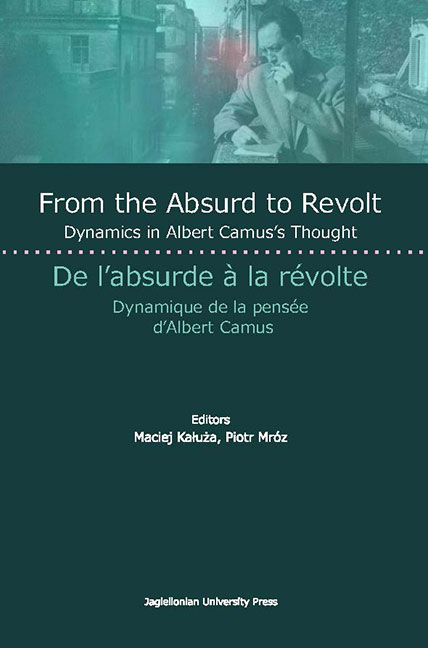Book contents
- Frontmatter
- Contents
- Introduction
- Part One From the Absurd to Revolt, Analysis of Sources for Camusian Concept of Revolt
- Profound Indifference: The Source of Revolt in the Early Writings of Camus
- Un personnage emblématique : Caligula, ou la pensée en action de l'absurde à la révolte
- La Peste, de l'absurde à la révolte : les limites de l'engagement
- Camus’ Religious Revolt in The Plague
- Lire et écouter pour écrire L'Homme révolté
- The Dynamics in Meaning of Absurdity and Revolt: between La liberté absurde and L'absurde et le meurtre
- Part Two Camus's Revolt in Contemporary Analysis
- Part Three Camus's Revolt in Comparatistic Studies
Profound Indifference: The Source of Revolt in the Early Writings of Camus
from Part One - From the Absurd to Revolt, Analysis of Sources for Camusian Concept of Revolt
Published online by Cambridge University Press: 22 December 2017
- Frontmatter
- Contents
- Introduction
- Part One From the Absurd to Revolt, Analysis of Sources for Camusian Concept of Revolt
- Profound Indifference: The Source of Revolt in the Early Writings of Camus
- Un personnage emblématique : Caligula, ou la pensée en action de l'absurde à la révolte
- La Peste, de l'absurde à la révolte : les limites de l'engagement
- Camus’ Religious Revolt in The Plague
- Lire et écouter pour écrire L'Homme révolté
- The Dynamics in Meaning of Absurdity and Revolt: between La liberté absurde and L'absurde et le meurtre
- Part Two Camus's Revolt in Contemporary Analysis
- Part Three Camus's Revolt in Comparatistic Studies
Summary
INTRODUCTION
I have considered the “early writings” of Albert Camus as: the five essays collected in The Wrong Side and the Right Side; the four of Nuptials; the abandoned novella A Happy Death; The Stranger; and the long essay The Myth of Sisyphus. For brevity, i have omitted all but the briefest reference to Camus's plays, The Misunderstanding and Caligula, as discussion of these works would neither add nor subtract greatly from my argument. Finally, because i am interested in Camus's philosophical response to indifference, and in particular his conception of profound indifference, i will not be looking at his journalistic work. The Plague represents a strong shift in Camus's attitude to indifference; the introduction of the social question adds an entirely new dimension to his concept of revolt. since i am interested here in indifference as the origin of revolt, i stop short before this novel.
VARIETIES OF INDIFFERENCE
There are many ways of being indifferent and almost limitless objects to which one can be indifferent. Indifference can be a vice; in the common usage of the label it most often is, but there are forms of indifference that are virtuous. And it is possible for an individual to live a life that is indifferent to some object in a way that is contemptible while at the same time exhibiting indifference to some other object in a way that is commendable. when we say of a person that they are indifferent contra indifferent to some object, what we usually mean is they are apathetically indifferent to some aspect of life in a way dam-aging to character. However, as we shall see, it is possible to be indifferent in a way that is character building. in my discussion of Camus's different uses of indifference, i will be drawing heavily on Lillehammer's work on varieties of indifference in which he identifies eight kinds divided equally into virtues and vices. i will give a brief overview of these indifferences with one or two examples of each taken from Camus's work. My intention here is to lay the ground for discussion of indifference later in this article.
- Type
- Chapter
- Information
- From the Absurd to Revolt/De l'absurde a la Revolte , pp. 15 - 30Publisher: Jagiellonian University PressPrint publication year: 2017



